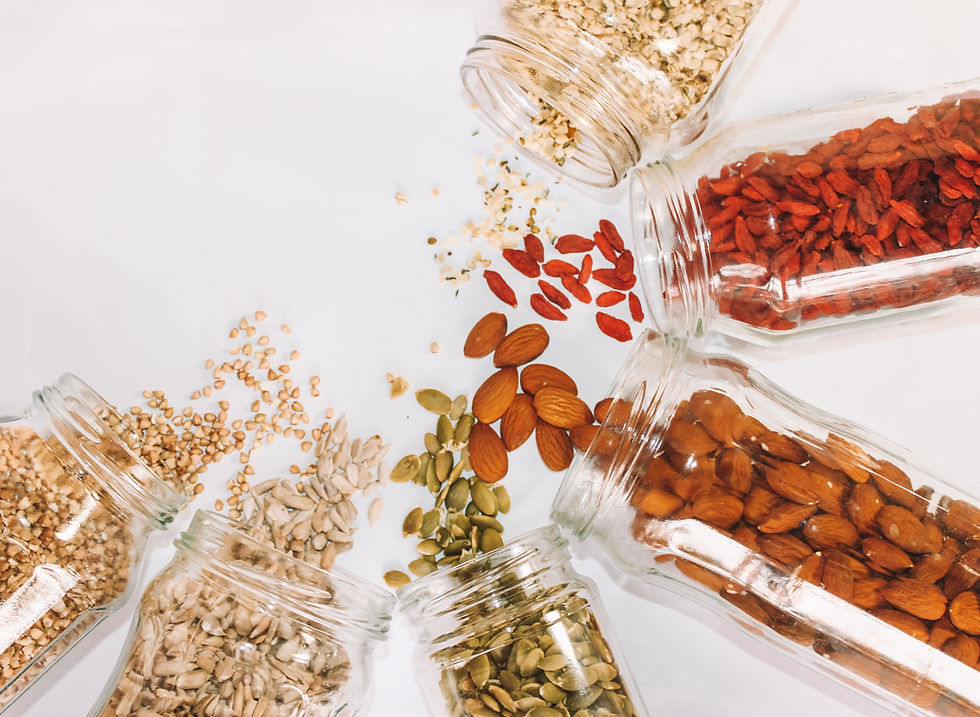Managing Polycystic Ovary Syndrome (PCOS): Addressing Insulin, Testosterone, and Inflammation
- Dr. Kellyann Tomko, ND

- Aug 27, 2023
- 3 min read
Updated: Feb 11, 2025
PCOS: More Than Meets the Eye
All too often, patients visit their doctors or OB/GYNs due to menstrual irregularities, only to be told that they have Polycystic Ovary Syndrome or PCOS. They are then informed that nothing can be done except taking oral contraceptives and/or Metformin. Research is pointing towards insulin, testosterone, and underlying inflammation as key drivers in this multifactorial syndrome. Despite its complexity, there are other effective solutions besides medications.
The Prevalence and Complications of PCOS
Approximately 1 in 10 women of childbearing age will struggle with PCOS and its complications before reaching menopause. These complications can include unwanted hair growth (hirsutism), acne, stubborn weight gain, depression, and infertility [1]. While patients may experience these outward effects of PCOS, it is important to consider the internal biochemical pathways of PCOS—this is where insulin, testosterone, and inflammation come into play.
Unveiling Insulin's Crucial Role
Insulin is a critical hormone that allows glucose from food to enter the cells. When the body's cells are unable to recognize insulin, this leads to insulin resistance and a rise of unused insulin in the body. Over time, high levels of fasting insulin contribute to inflammation, which simultaneously continues this vicious cycle of increasing testosterone and tumor necrosis factor alpha (TNF alpha) [2]. However, reducing and normalizing fasting insulin levels also decreases testosterone and improves ovarian function.

The Equilibrium of Testosterone in Women
Testosterone is also an important hormone for women, just as it is for men. Women need testosterone to maintain muscle mass, cognitive function, and sexual function. However, high testosterone levels in women increase cytokines, contributing to elevated inflammation in PCOS [3]. Not only can elevated testosterone levels lead to infertility, but heightened levels of cytokines and inflammation are also detrimental to the female menstrual cycle, resulting in painful periods or dysmenorrhea.
Inflammation: The Core of PCOS
Low-grade inflammation seems to be a recurring theme among patients with PCOS [4]. While the ovary requires a small amount of inflammation to function normally, inflammatory levels need to be kept in check. The pro-inflammatory cytokine tumor necrosis factor alpha (TNF alpha) has
been found to be elevated in patients with PCOS, regardless of whether the patient is overweight or obese. Therefore, addressing underlying inflammation in PCOS is imperative for long-term resolution.
Navigating PCOS: A Tailored Approach
PCOS, a multifaceted syndrome, often mimics other disorders, necessitating a personalized strategy. The key to effective management lies in addressing inflammation and its root causes. Embark on your journey to better health—schedule a complimentary 15-minute consultation today!
At IVY Integrative, you can work with one practitioner or build your own team of holistic practitioners! Reach your optimum health in-person or online. Check out our Get Started page to learn how to work with us!
Author: Dr. Kellyann Tomko, ND
References
Sadeghi HM, Adeli I, Calina D, Docea AO, Mousavi T, Daniali M, Nikfar S, Tsatsakis A, Abdollahi M. Polycystic Ovary Syndrome: A Comprehensive Review of Pathogenesis, Management, and Drug Repurposing. Int J Mol Sci. 2022 Jan 6;23(2):583. doi: 10.3390/ijms23020583. PMID: 35054768; PMCID: PMC8775814.
Ding H, Zhang J, Zhang F, Zhang S, Chen X, Liang W, Xie Q. Resistance to the Insulin and Elevated Level of Androgen: A Major Cause of Polycystic Ovary Syndrome. Front Endocrinol (Lausanne). 2021 Oct 20;12:741764. doi: 10.3389/fendo.2021.741764. PMID: 34745009; PMCID: PMC8564180.
Shabbir S, Khurram E, Moorthi VS, Eissa YTH, Kamal MA, Butler AE. The interplay between androgens and the immune response in polycystic ovary syndrome. J Transl Med. 2023 Apr 16;21(1):259. doi: 10.1186/s12967-023-04116-4. PMID: 37062827; PMCID: PMC10105935.
González F. Inflammation in Polycystic Ovary Syndrome: underpinning of insulin resistance and ovarian dysfunction. Steroids. 2012 Mar 10;77(4):300-5. doi: 10.1016/j.steroids.2011.12.003. Epub 2011 Dec 8. PMID: 22178787; PMCID: PMC3309040.
Disclaimer:
This information is generalized and intended for educational purposes only. Due to potential individual contraindications, please see your primary care provider before implementing any strategies in these posts.



